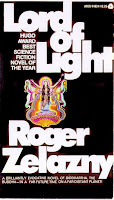But after "Collapse," the last book reviewed here, I am now without any books to read. This will probably be the case until at least Chinese New Year, when I'm sure I'll be in Taipei, Kaohsiung, or some other place where I can buy books. Until then, consider this the end of my book reviews.
You can click on the titles for a longer review of each book.
10 Best Books
1. "Childhood's End" by Arthur C. Clarke
This is the book that made Clarke famous, and this is also a book that proves his fame is well-deserved. Not only is it well thought out and meticulously plotted, but the prose is far superior to what you find in most science fiction novels. Truly a great work by a great writer.
2. "A Century of Science Fiction 1950-1959" edited by Robert Silverberg
There are a few stories in this one that are probably best forgotten, but for each forgettable story there are two excellent works of short fiction. My favorites in this one were the stories by Philip Jose Farmer and Jack Vance.
3. "The Gates of Creation" by Philip Jose Farmer
Kind of like Conan the Barbarian meets Dune. This is the second book in Farmer's "World of Tiers" series, and I would love to read the other two books. Farmer might have written a lot of crap, but this novel is excellent.
4. "Soul Catcher" by Frank Herbert
Perhaps the only "serious" (non-genre) fiction penned by Herbert. This one takes place in the Pacific Northwest, where an Indian guide kidnaps a young boy. The ending is a bit disappointing, but this book gets deep.
5. "A Canticle for Leibowitz" by Walter M. Miller Jr.
Possibly one of the most profound science fiction novels ever written. Miller Jr.'s novel of post-apocalyptic survival does not make for easy reading, but it is the kind of book that makes an impression.
6. "Venus Plus X" by Theodore Sturgeon
This book is trippy, and I like that. One of Theodore Sturgeon's two most famous books, this one explores the battle of the sexes from the perspective of an alien race. Even if you don't agree with the author's historical premise, it's still a great story.
7. "All the Pretty Horses" by Cormac McCarthy
The first book in McCarthy's "Border Trilogy." This one follows two friends as they explore Mexico on horseback. The part in the Mexican prison is one of the most harrowing things I've ever read.
8. "Jazz" by Toni Morrison
Even if some of this book does invite unflattering comparisons to Faulkner, Morrison's "Jazz" is very much its own novel, with its own kind of story to tell. Definitely worth reading.
9. "Peace on Earth" by Stanislaw Lem
Lem at his most slapstick, and Lem at his most paranoid. An astronaut visits robots on the moon, and returns with a brain severed into two halves. Certainly one of the strangest and best science fiction novels I've ever read.
10. "Radio Free Albemuth" by Philip K. Dick
A nice companion to Dick's VALIS. In this book, which can be considered a forerunner of that more famous book, Dick explores the relationship between a record executive, the extraterrestrial intelligence offering him "enlightenment," and a tyrant bent on (inter)national domination.
Honorable Mention: Frank Herbert's "The Eyes of Heisenberg"
5 Books That Just Weren't Very Good
1. "Lord of Light" by Roger Zelazny
Buddha without the Buddhism. Science fiction without the science. Gods war against one another with gizmos, and none of it makes a great deal of sense.
2. "The Heaven Makers" by Frank Herbert
Wow this book was boring. One of the worst books Herbert ever wrote, and certainly one of the reasons people can't take him seriously outside of "Dune." The sexual parts were almost interesting, but they couldn't save the book.
3. "Gather, Darkness!" by Fritz Leiber
An order of monks brainwash the populace with a technology they themselves don't understand. This one might make even less sense than "Lord of Light."
4. "The White Plague" by Frank Herbert
Wow this book is even more boring than "The Heaven Makers" - and also a lot longer. A plague decimates the women of the world, and leaves the men searching for answers. It tries to be deep, but fails miserably.
5. "Microworlds" by Stanislaw Lem
Lem comes across as a cranky old man in the non-fiction "Microworlds." I am sorry that he ever wrote this book, for the simple reason that it will dissuade people from reading his novels - some of which are fantastic. In this book Lem attempts to put science fiction under a microscope, but the order of magnification is so high that he fails to see anything of substance.
Dishonorable Mention: Marion Zimmer Bradley's "The Planet Savers/Sword of Aldones."
.jpg)

沒有留言:
張貼留言